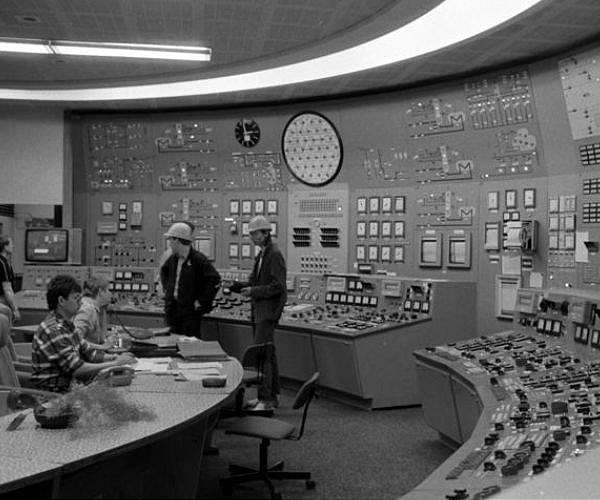
Germany says energy supply safe despite nuclear exit
Berlin (AFP) April 15 - Switching off Germany's remaining nuclear plants will not put the country's power supply at risk despite the energy crisis caused by the war in Ukraine, ministers said Thursday. Germany's "security of supply is and will be assured" despite the nuclear exit, Economy Minister Robert Habeck said in a statement. Germany's last three reactors will go offline on Saturday, the culmination of a long-planned departure from atomic power.
Germany switched off its last three nuclear reactors on Saturday, exiting atomic power even as it seeks to wean itself off fossil fuels and manage an energy crisis caused by the war in Ukraine.
While many Western countries are upping their investments in atomic energy to reduce their emissions, Germany brought an early end to its nuclear age.
It's "the end of an era," the RWE energy firm said in a statement shortly after midnight confirming the three reactors had been disconnected from the electricity grid.
Europe's largest economy has been looking to leave behind nuclear power since 2002, but the phase-out was accelerated by former chancellor Angela Merkel in 2011 after the Fukushima nuclear disaster in Japan.
The exit decision was popular in a country with a powerful anti-nuclear movement, stoked by lingering fears of a Cold War conflict and atomic disasters such as Chernobyl in Ukraine.
"The risks of nuclear power are ultimately unmanageable," said Environment Minister Steffi Lemke, who this week made a pilgrimage to the ill-fated Japanese plant ahead of a G7 meeting in the country.
Anti-nuclear demonstrators took to the streets in several German cities to mark the closures.
Greenpeace, at the heart of the anti-nuclear movement, organised a celebratory party at the Brandenburg Gate in Berlin.
"We are putting an end to a dangerous, unsustainable and costly technology," said Green MP Juergen Trittin.
In front of the Brandenburg Gate, activists symbolically slayed a model dinosaur.
- 'A mistake' -
Initially planned for the end of 2022, Germany's nuclear exit was delayed as Russian gas supplies dwindled.
Germany, the largest emitter in the European Union, also powered up some of its mothballed coal-fuelled plants to cover the potential gap left by gas.
The challenging energy situation had increased calls domestically for the exit from nuclear to be delayed.
Germany had to "expand the supply of energy and not restrict it any further" in light of potential shortages and high prices, the president of the German chamber of commerce Peter Adrian told the Rheinische Post daily.
Friedrich Merz, leader of the opposition CDU party, said the abandonment of nuclear power was the result of an "almost fanatical bias".
Meanwhile the conservative daily FAZ headlined its Saturday edition "Thanks, nuclear energy," as it listed benefits it said nuclear had brought the country over the years.
Outside observers have been similarly irked by Germany's insistence on exiting nuclear while ramping up its coal usage, with climate activist Greta Thunberg in October slamming the move as "a mistake".
- 'Sooner or later' -
As expected, the Isar 2 reactor in the southeast of the country, the Neckarwestheim facility in the southwest and Emsland in the northwest were disconnected from the electricity network before midnight.
Earlier, Guido Knott, CEO of PreussenElektra, which operates Isar 2, said it would be "a very moving moment" to power down the reactor.
The three final plants provided just six percent of Germany's energy last year, compared with 30.8 percent from all nuclear plants in 1997.
"Sooner or later" the reactors will start being dismantled, Economy Minister Robert Habeck told the Funke group ahead of the scheduled decommissioning, brushing aside the idea of an extension.
The government has the energy situation "under control", Habeck assured, having filled gas stores and built new infrastructure for the import of liquefied natural gas to bridge the gap left by Russian supplies.
Instead, the minister is focused on getting Germany to produce 80 percent of its energy from renewables by 2030.
To this end, Chancellor Olaf Scholz has called for the installation of "four to five wind turbines a day" over the next few years -- a tall order given that just 551 were installed last year.
But the current rate of progress on renewables could well be too slow for Germany to meet its climate protection goals.
Despite planning to exit nuclear, Germany has not "pushed ahead enough with the expansion of renewables in the last 10 years", Simon Mueller from the Agora Energiewende think tank told AFP.
To build enough onshore wind capacity, according to Mueller, Germany now has to "pull out all the stops".